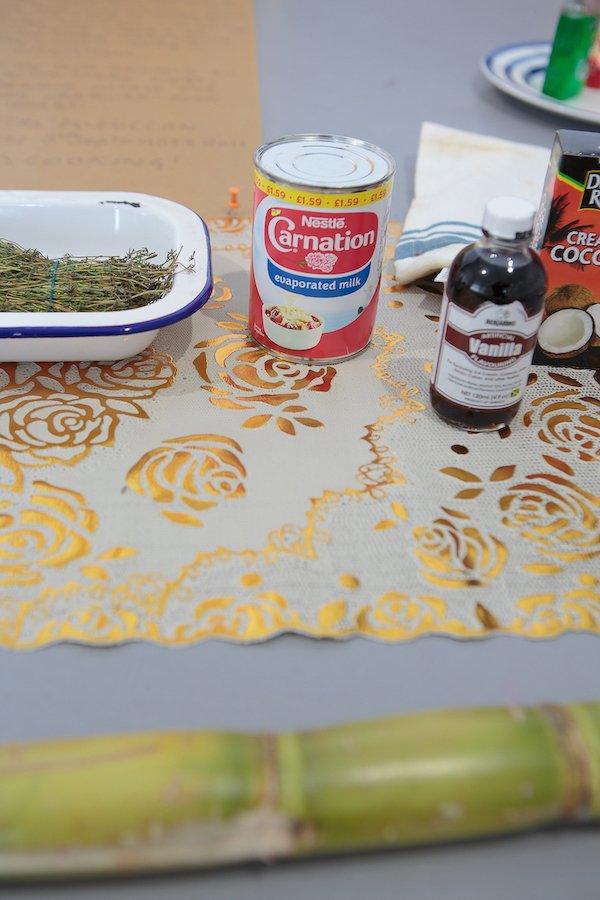I Miss My Mum’s Cookin’ (Brighton Fringe) award nominated
I Miss My Mum’s Cookin’ was first iterated as part of the Caribbean art group exhibition, Who More Sci Fi Than Us, curated by Nancy Hoffman at the KAdE Kunsthal, Amersfoort, 2012, and uses cooking utensils belonging to McMillan’s mother after she passed away in 2011. This iteration commissioned by UrbanFlo Creative and Black at Sussex for the Brighton Fringe 2023 & Culture Connex Festival, enabled McMillan to explore other food cultures legacies and identities from the African diaspora.
Weekends were emblematic of the food culture McMillan grew up with; his mum wouldn’t normally cook on Fridays, which meant ‘take-away’ Chinese or fish and chips. They cleaned the whole house on Saturday, especially the front room, and McMillan’s mum would go to Ridley Road Market with the trolley in tow for provisions to make Saturday Soup with boiled dumplings. If they went out raving to a house party that night, curry goat and white rice was de rigueur served to guests, and no matter what time they got home, they had to be ready for church Sunday morning after a breakfast of fried pilchards in tomato sauce with bakes (fried dumplings). The weekend’s highlight was Sunday dinner, especially if guests were coming round, and usually included stew chicken, rice and peas, boiled sweet potato, homemade coleslaw, washed down with homemade Guinness punch or Mauby (Eastern Caribbean beverage), while Jim Reeves crackled from the radiogram in the front room.
McMillan never saw either of his parents, especially his mum, measure any ingredients, but instead used their senses: sight, taste, smell, touch, and sound selecting and sourcing ingredients, usually fresh, their portions, preparation methods, cooking techniques that involved knowing instinctively when to use high and low heat. Rather than orthodox recipes based on precise measurements, McMillan supported signature recipes that he collected based on intuition, which are printed here on tea towels in the colour indigo (an ancient colour dye that was produced on Caribbean slave plantations) on hung on clothes lines with wooden pegs.
These recipes, whether traditional, varied or invented, all share thorough (swingeing chicken hairs), cleaning, washing and seasoning meat or fish ingredients. Attention to food hygiene and seasoning preparation, derives from slave plantations culinary practices, to make edible poor quality, sometimes rotten, off-cuts of meat or fish they had available (such as pig trotters, pork belly, oxtail, fish head) before cooking. This also included salting or smoking ingredients: pigtail, saltfish, salt-beef or smoked mackerel, to preserve them. Ironically, the delicious dishes that these resourceful ancestors created, was what the slave owners craved for and depended on. The legacy of this ‘sweet food’ is the presence of sugar and salt in our diet and bodies that today is linked to the high incidence of diabetes and high blood pressure related health issues in diasporic Black communities.
Food is consumed, which as an embodied experience of taste is not simply the choice of dish, but when, how and with whom it is eaten, and what feelings it evokes/invokes about pleasure, desire, subjectivity and the being and becoming of identity. Some of the food packaging McMillan grew up displayed racist caricatures of Black bodies: golliwogs on Robertson’s jam jars, Black Mama and Uncle Tom figures on packets of Aunt Jemina’s Pancake Mix and Uncle Ben’s rice with its uncanny echoes of blackface minstrelsy.
As Stuart Hall once said, ‘We are here, because you were there’, and through colonialism, imperialism and post-war migration White British people smelt cinnamon, nutmeg and vanilla; tasted tomatoes, potatoes, sugar, coffee, tea, bananas, mangoes, oranges, pineapples, chilli peppers, lemon grass, okra, yams, and herbs like coriander, oregano, etc, etc. Black and Brown food cultures are often Othered as exotic, strange, smelly, too ‘spicey’ (read too much hot pepper), yet curry has become the national dish in British. Nothing exists until a White man discovers it, and the current fetish for all things natural and nutritional, such as the ‘discovery’ of coconut, is really only old-time knowledge for Black and Brown communities.
















